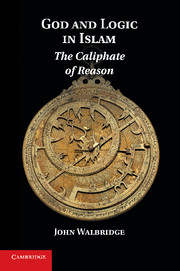Book contents
- Frontmatter
- Contents
- Illustrations
- Preface and Acknowledgements
- Spelling, Names, and Sources
- Introduction
- PART ONE THE FORMATION OF THE ISLAMIC TRADITION OF REASON
- PART TWO LOGIC, EDUCATION, AND DOUBT
- 6 Where Is Islamic Logic? The Triumph of Scholastic Rationalism in Islamic Education
- 7 The Long Afternoon of Islamic Logic
- 8 The Institutionalization of Disagreement
- PART THREE THE FALL AND THE FUTURE OF ISLAMIC RATIONALISM
- Selected Bibliography
- Index
7 - The Long Afternoon of Islamic Logic
Published online by Cambridge University Press: 01 March 2011
- Frontmatter
- Contents
- Illustrations
- Preface and Acknowledgements
- Spelling, Names, and Sources
- Introduction
- PART ONE THE FORMATION OF THE ISLAMIC TRADITION OF REASON
- PART TWO LOGIC, EDUCATION, AND DOUBT
- 6 Where Is Islamic Logic? The Triumph of Scholastic Rationalism in Islamic Education
- 7 The Long Afternoon of Islamic Logic
- 8 The Institutionalization of Disagreement
- PART THREE THE FALL AND THE FUTURE OF ISLAMIC RATIONALISM
- Selected Bibliography
- Index
Summary
As we have seen, what the Stoics and the medieval Europeans considered to be logic is, in Islamic intellectual life, spread across a number of disciplines, including legal theory, grammar, and literary rhetoric. Nevertheless, logic in its narrow Aristotelian sense played an important role in Islamic intellectual life. This tradition of study and teaching of logic is interesting and important in its own right, but it is also an especially good illustration of the role of scholastic rationalism in Islamic intellectual culture, particularly in education.
For some seven hundred years, seminaries across the Islamic world have required that students take a rigorous course of traditional logic. Instruction was based on a series of short textbooks, explicated through commentaries and glosses. The textbooks of this “school logic” reflected the essentially oral quality of instruction in the seminaries. Given that the seminary training equipped students to explicate Islamic law from sacred texts, it is not surprising that the emphasis of the school logic was on semantics. The school logic was closely linked with philosophical logic, which differed from it in emphasis, and with the disciplines of the principles of jurisprudence and Arabic linguistics. Despite some influence from Western logic, the school logic is still taught as a basic part of the curriculum in Islamic seminaries in Egypt, Iran, and the Subcontinent.
- Type
- Chapter
- Information
- God and Logic in IslamThe Caliphate of Reason, pp. 121 - 141Publisher: Cambridge University PressPrint publication year: 2010



